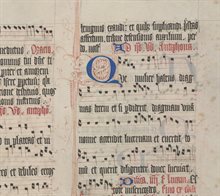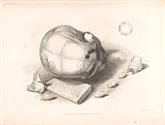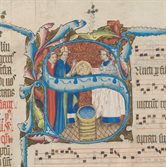Plants and Prayers
This exhibition ran from Thursday 30 March until Sunday 3 September 2023, at the Weston Gallery, Lakeside Arts.
Healing is what makes us human – but concepts of health and methods of healing have changed much over time. This exhibition explores medicine, care, and healing before 1700 and some of the changes that led to the development of medicine as we know it today. Healthcare in the past was not just the domain of the physician: priests to apothecaries to barbers all provided different forms of care. Medical manuscripts and books tell us about diseases, treatments, the relationship between healer and patient, and the lengths to which people went to find cures.
This exhibition was jointly curated by University of Nottingham Libraries, Manuscripts and Special Collections and Dr Christina Lee, School of English, University of Nottingham, and Dr Erin Connelly, School of Life Sciences, University of Warwick.
Exhibition themes
Six exhibition boards were on display in the Gallery. These can be downloaded or viewed online as Adobe PDFs.
Further Research
Items from our collections are available to consult in the Manuscripts and Special Collections reading room on King's Meadow Campus.
Links to our catalogues, and specific collections relating to the history of medicine can be found below.
Films: Watch our series of films about items which feature in the exhibition
Watch a video of the Wollaton Antiphonal (15th century) from St Leonard's parish church, Wollaton, Nottinghamshire.
Mutiat Akamo presents the importance of taking historical medicinal techniques seriously in the modern age.
Learn about medicinal recipes from the book A Way to Get Wealth by Gervase Markham, 1683.
Discover the household recipe book of Elenor Mundy, 1728-c.1767.
Watch a video from AncientBiotics: A Medieval Remedy for Modern Day Superbugs?
Turning the Pages of the Wollaton Antiphonal: sound and images from a 15th century book of music for Catholic religious services.

Go to the Antiphonal
From the blog
Read our blogs, guest blogs, and Discover magazine articles about early modern medicine
The Art of Anatomy

Laura Mercer, postgraduate researcher, on her project to index images in the Nottingham Medico-Chirurgical Society's rare books.
Go to article
Simple Medicine

A look at some of the ingredients used in the 'Livres des Simples Medicines’, a 15th century French herbal.
Go to blog post
How working on the ‘Plants & Prayers’ exhibition gave me post-uni clarity

Intern Mutiat reflects on her role in the exhibition.
Go to blog post
Events
Programme of talks and events at the Djanogly Theatre, Lakeside Arts.
Recordings of some of the talks were made available after the exhibition closed.
Lunchtime Talks
Pustules and Potions: What was medieval medicine really like?
Tuesday 4 April, 1-2pm
Djanogly Theatre, Lakeside Arts
Suitable for ages 14+. Please be aware that there will be images of disease and illness.
The perception is that medieval medicine was backward – but is this true? Dr Christina Lee explores what medieval healing and medicine looked like, from remedies and healing practices to the question of where people could seek help for their illnesses, and explores the changes to medicine over time.
Elixirs and Stains: Exploring approaches to medieval medical manuscripts
Wednesday 19 April, 1-2pm
Djanogly Theatre, Lakeside Arts
Dr Erin Connelly explores technologies involving analysis of manuscript stains and the creation of medical ingredient networks using tools from complex network mathematics and digital humanities. The talk discusses these and their applications to modern questions of ethnopharmacology and antimicrobial efficacy.
Medicine on the Move: The introduction of ingredients and information in the early medieval west
Wednesday 10 May, 1-2pm
Djanogly Theatre, Lakeside Arts
Dr Claire Burridge shares her research on early medieval medical recipes, highlighting the appearance of non-local ingredients that were unrecorded in classical medical writings. To what extent does the inclusion of exotic ingredients, such as ambergris and camphor, shed light on the movement of medical knowledge?
Proteins from Print: Scientific evidence of usage of ingredients in historical medicinal recipes
Thursday 15 June, 1-2pm
Djanogly Gallery, Lakeside Arts
The emerging field of ‘biocodicology’, where biological data contained within old books and manuscripts is interrogated, offers opportunities to apply a molecular narrative to material culture. Professor Robert Layfield explores the possibility that protein residues, preserved for centuries on the surfaces of books and manuscripts containing historical medicinal recipes, may be alive with biological information that speaks to their handling and use.
Other events
Guided walk: Health and disease in medieval Nottingham
Saturday 3 June, 10am-12noon
Nottingham City Centre
Explore places of health, illness and pollution in the pre-modern urban landscape with Dr Chris King. What was the standard of health and medicine? Were medieval towns really as dirty and disease-ridden as popular myth would have us believe?
Family activity: Meet a medieval doctor!
Saturday 19 August, 1pm-3pm
Meeting room 1, Lakeside Arts
Find out about the medicines and charms used by early medieval English people by talking to Wulfhild, our 10th century “leech” or doctor. Come and see, touch and smell some of the plants and other natural materials used to treat a range of illnesses. Bloodletting is optional!
Free, just drop in
Suitable for all ages, children must be accompanied by an adult
Get the latest updates
Follow Manuscripts and Special Collections Exhibitions on twitter @msslakeside to keep up to date with the latest exhibition news.